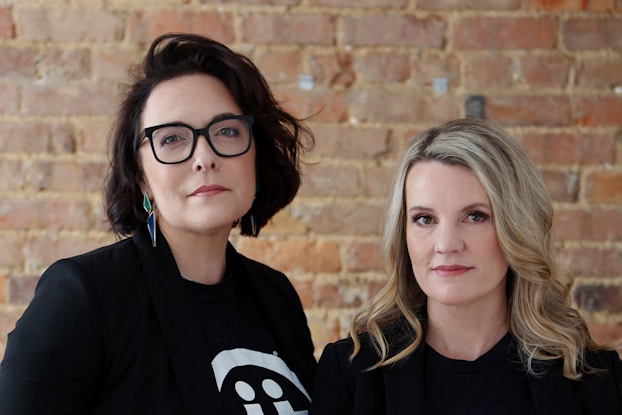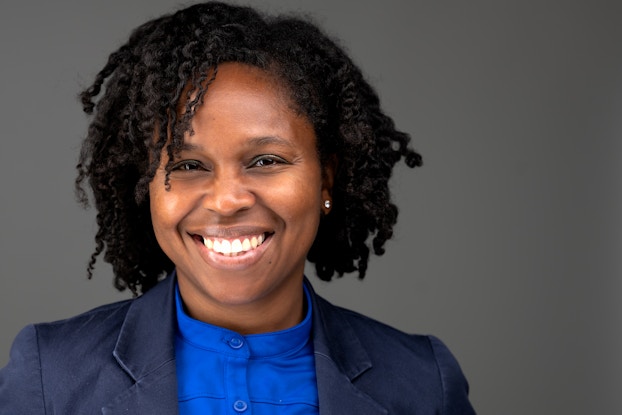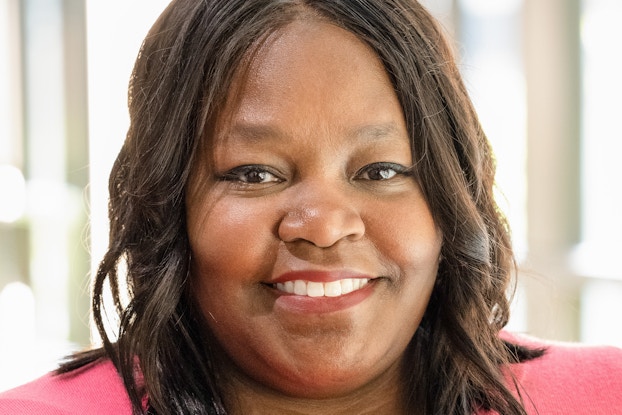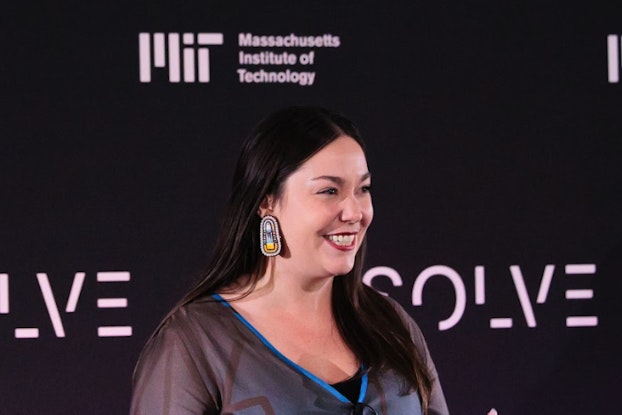
Why it matters:
- Across America, corporations and other organizations are sponsoring accelerator programs to help level the playing field for female founders.
- These programs provide mentorship, technical support, fundraising and networking opportunities for women entrepreneurs.
- Currently just 1.9% of venture capital goes to female-founded companies, according to a recent report by McKinsey & Co.
Liza Rodewald knows firsthand about the struggles female entrepreneurs face when trying to transform a great idea into a venture-capital-backed startup.
In 2016, the software consultant decided to develop a career marketplace known as Instant Teams, for remote workers that would connect military spouses to company employers. She saw the need for such a service while living at U.S. Army and Air Force bases across the country while her husband Justin served a stint as an EOD Officer in the U.S. Army. This overlooked talent pool has a 22% unemployment rate, making it one of the highest unemployed demographics in the country, according to a report from Hiring Our Heroes, an initiative by the U.S. Chamber of Commerce Foundation.
Rodewald’s first step was to partner with another military spouse — Erica McMannes, the startup’s Chief People and Community Officer. She is a former consultant for Silicon Valley startups who is knowledgeable about identifying military talent for military acquisition teams.
“Right from the start, we knew we needed business connections that could help us develop a business plan and get funding for our ambitious undertaking. It wasn’t a venture that could just be bootstrapped,” Rodewald, CEO of Instant Teams, recalls. “As women entrepreneurs, we knew the odds were stacked against us since only a tiny slice of all venture capital in the U.S. is allocated to female-led startups.”

The co-founders’ first step was to validate their business concept and then go on a hunt for mentors and financing. So, they went to Silicon Valley and made cold calls to HR execs at Google, X (formerly Twitter), and tech startup platform Plug and Play to gauge their interest in the business concept. They also tapped on the door of Ryan Micheletti of the Founder Institute, a nonprofit that helps veterans fund and scale tech startups. Micheletti is also the general partner of The Veteran Fund, a venture capital fund that invests in technology startups led by founders of the military community.
“During our tour, everyone was intrigued by our idea to help military spouses get jobs,” said Rodewald. “Micheletti agreed to be our mentor and he gave us good advice: Apply for a scholarship at the Founder Institute to learn how to develop a company business plan, pitch investors, and build a business network.”
That tip was a gamechanger. The Founder Institute is also a pre-seed accelerator that has helped thousands of women hatch startups through their virtual programs in the U.S. and abroad. Rodewald applied and was awarded a scholarship to its three-month program as part of its Washington, D.C. cohort in January 2018.
During the program, Rodewald developed financial projections for her venture to show anticipated growth plans, and she learned how to pitch to investors. She also began to build a network of potential investors through the accelerator’s vast angel and venture capital network. Months later, she was able to raise $600,000 in venture capital from Right Side Capital Management, a firm that invests in pre-seed tech startups, and a group of angel investors.
Since then, Instant Teams has been on a growth trajectory. It’s raised $16 million in venture capital from such prestigious VC firms as Tiger Global. The capital has been used to launch its online HR platform that now has 32,000 job seekers looking to be matched to 25 employers of all sizes — including Amazon, Walmart, Prudential, and Aflac.
Already it has placed 5,000 military spouses in remote jobs and has generated $40 million of income for military families. Rodewald won’t disclose company revenues, but notes that Instant Teams gets a placement fee from jobseekers, as well as a one-time finders’ fee from employers that is typically 10% of a hire’s annual salary.
Across the U.S., big brands Like Google and Amazon have launched accelerators to help level the playing field for female founders like Rodewald. It’s a growing movement as the country continues to awaken to gender inequity, and inequity among marginalized groups in general.
Currently just 1.9% of venture capital goes to female-founded companies, according to a recent report by McKinsey & Co. It’s a sobering statistic when you consider that women own 36% of all U.S. businesses. As a result, about 80% of female tech startup leaders report using their own personal savings in starting a new business, a survey by the Kauffman Foundation reveals.
These accelerator programs for female founders provide mentorship, technical support, fundraising and networking opportunities most women entrepreneurs need. They also spent a lot of time helping women hone their pitching skills since some tend to undervalue themselves when presenting their business plans to investors.
“Women face a lot of systemic barriers—including the lack of access to capital and business networks,” says Ashley Francisco, Google’s Head of Startup Ecosystem, North America who runs the Google for Startups: Accelerator Women Founders, a program launched in 2020. “It is hard for them to change the status quo, so we are trying to provide the support they need.”

Google’s accelerator for women founders: a 10-week crash course on scaling a startup
Google’s 10-week program gives women entrepreneurs a crash course on the basic skills they need to grow and scale their startup. It includes workshops focused on product design, customer acquisition, and leadership development for founders. In addition, founders get mentorship help from Google experts on a host of issues including marketing and business strategy.
In addition, eligible founders get $100,000 worth of Google Cloud credits they can use to set up a Google Cloud account.
Tina Williams-Koroma, who went through the program in 2022, said it was instrumental in helping her build her cybersecurity startup, CyDeploy. The Baltimore-based company uses machine learning to solve the problem of technology changes in systems that result in disrupted operations.
“The resources and access to their network proved invaluable,” said the CyDeploy CEO, noting that Google’s technical experts helped her develop the company’s machine learning product. “When investors see Google is in your corner, it opens doors.”
To date, Williams-Koroma has raised $1.1 million in pre-seed financing. Of the total, $350,000 is from grants from Google’s Black Founders Fund, Amazon’s AWS Impact Accelerator for underrepresented founders, the T. Rowe Price Foundation, and other pitch competition awards. The money is being used to add features to CyDeploy’s product and for marketing and sales.
[Read: How WOC-Owned Startups Are Tapping the Multitrillion-Dollar U.S. Women’s Market for Growth]
Currently just 1.9% of venture capital goes to female-founded companies, according to a recent report by McKinsey & Co.
Amazon’s ‘Impact Accelerator’: ‘There is a clear need to help women founders pursue their ideas and scale their companies’
Amazon Web Services, a division of Amazon that provides on-demand cloud computing services, is another corporate goliath trying to help female founders who are launching tech startups in the U.S. It launched its AWS Impact Accelerator: Women Founders in 2022. Participants in its program receive up to $225,000 in cash and AWS Activate credits, training, mentoring, technical guidance from Amazon leaders, and networking opportunities with potential investors, as well as ongoing advisory support.
“There is a clear need to help women founders pursue their ideas and scale their companies,” says Denise Quashie, Head of Worldwide Startup Marketing Programs and creator of the AWS Impact Accelerator. She noted that the AWS accelerator program is designed to help tech startups build unique cloud-based solutions for their industry whether it be in gaming, travel or fintech.
So far, 25 women have gone through the AWS program. And many alumni startup founders have gone on to get funding through programs like Techstars, a pre-seed investor for tech startups, and via pitching competitions, Quashie said.
Among them is Amber Buker, Co-founder and CEO of Totem. The Tulsa, Oklahoma based startup has created a digital banking app to serve the needs of the 11.1 million Native Americans in the U.S. — many of whom are underbanked. A member of the Choctaw Nation, Buker went through the AWS accelerator program last year and has raised over $2.2 million in pre-seed financing. Totem now offers spend accounts and debit cards with no monthly fees and no balance minimums, which are offered in partnership with Visa issued by First Pryority Bank.

Before applying to an accelerator, ‘entrepreneurs have to do their homework’
While getting into an accelerator program can turbocharge success for a female founder, it’s important to shop around and choose a program that is right for them. These programs often focus on specific industry sectors, and stages of a startup’s development.
“Many accelerators fail because they don’t have the proper network to support [the] companies in their programs, so entrepreneurs have to do their homework before applying to one,” cautions Jonathan Greechan, Co-founder of Founder Institute, the world’s largest pre-seed accelerator.
Since its debut in 2009, Founder Institute has helped about 2,300 female founders launch businesses in the U.S. and worldwide. Many alumni have gone on to raise millions in follow-on financing, when a startup that’s already raised capital raises additional capital through another round of funding.

Tips for women founders
Women founders would be wise to look for accelerator programs that have strong business and mentor networks and access to investors through post funding programs, Greechan suggests. At the Founder Institute, for example, graduates work with a virtual Silicon Valley-based team to build an investor pipeline.
Some, like Stella Foundation—a virtual accelerator for women entrepreneurs, put a big emphasis on sharpening female founders’ pitching skills and their financial proformas and projections so they are funding ready.
It’s also important for founders to explore how these accelerators fund startups since some offer grants and others equity financing. They want to be sure to understand the terms and are not giving up too much equity in a new venture in exchange for capital, sources said.
“Start by researching available programs in your local ecosystem and begin connecting with other entrepreneurs who can share their experiences and give you referrals,” said CyDeploy’s Williams-Koroma.
“Above all, remember confidence is key,” she added. “If the chips are against you, just stick to your vision take your shot. Don’t let the naysayers dissuade you.”
CO— aims to bring you inspiration from leading respected experts. However, before making any business decision, you should consult a professional who can advise you based on your individual situation.
CO—is committed to helping you start, run and grow your small business. Learn more about the benefits of small business membership in the U.S. Chamber of Commerce, here.






